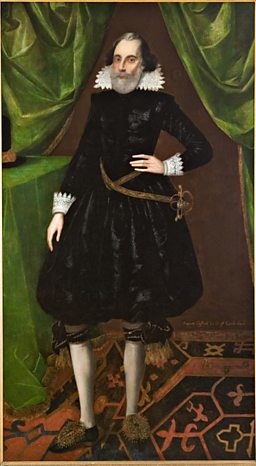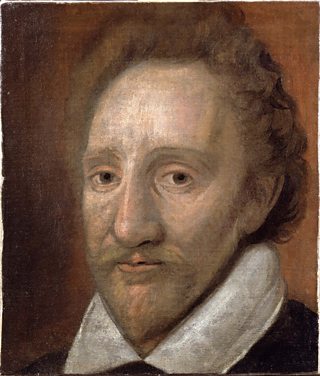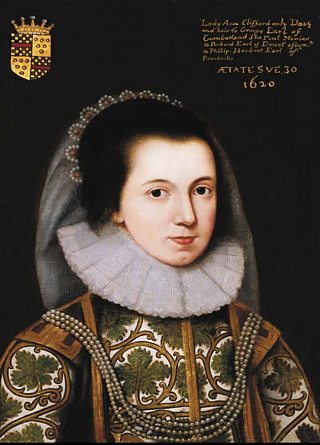A wealthy host attracts Shakespeare's actors to Yorkshire
By Dr Siobhan Keenan - Reader in Shakespeare and Renaissance Literature at De Montfort University, Leicester
Just a few years after Shakespeare’s death his company, the King’s Men, continued to perform – arriving at the home of a wealthy Yorkshire Earl famous for being a congenial host.
-
![]()
Much ado near me
Hear more Shakespeare stories on BBC Radio Humberside
-
![]()
Shakespeare Festival 2016
The BBC celebrates the genius of the bard

Image courtesy of Skipton Castle
Shakespeare’s company, the King’s Men, visited Londesborough Hall (the home of Sir Francis Clifford, 4th Earl of Cumberland) several times in the years shortly after Shakespeare’s death.
The first recorded visit in the family’s household accounts dates from 1619-20. On this occasion, the players stayed at Sir Francis’s house for two nights and were paid £5 for performing five plays.

The family’s pantry accounts reveal that they were also allowed three dinners and two suppers during their visit – such meals presumably being one of the perks of visiting country houses on tour!
The visits of the King’s Men post-date Shakespeare’s career with the company, but there is a good chance that their touring repertory included the plays of the company’s most famous playwright, and that Sir Francis and his guests had a chance to see a performance of one or more of Shakespeare plays in the great hall at Londesborough.
The company certainly continued to perform Shakespeare’s plays at court in the 1620s and 1630s.
The King’s Men returned to Londesborough in 1624-25 and 1628-29, although the household accounts suggest that the visit in 1624-25 may not have been by the official royal company. The entry records a payment of £3 for performances of three plays to ‘a Companie of Players goeing by the name of the kinges Players’, the ambiguous phrasing suggesting that the visitors might not have been who they claimed to be!
Unlicensed acting companies touring under false royal names and forged licences were a problem in the early seventeenth century, so it’s possible that the troupe that visited Londesborough in 1624-5 was not actually Shakespeare’s one-time company, but rather a group of opportunists masquerading under the royal troupe’s name and perhaps using some of its plays. Either way, the Cliffords do not seem to have been overly fussy and the players must have been reasonably good, given that they were welcomed for three performances and rewarded in similarly generous fashion as in 1619-20.
Who were the King's Men?
The King’s Men was the acting company in which Shakespeare was a member for most of his writing and acting career.

They were known as the Lord Chamberlain’s Men during the reign of Elizabeth I and become the King’s Men by the royal decree of King James I when he came to power in 1603.
In the royal patent of 1603, the King’s Men were named as – Lawrence Fletcher, William Shakespeare, Richard Burbage, Augustine Phillips, John Heminges, Henry Condell, William Sly, Robert Armin, Richard Cowley…”and the rest of their associates…”.
By the time of the troupe’s visit to Londesborough Hall in 1619/20 , several of the actors named in the patent had already died.
Lead actor Richard Burbage, who played Shakespeare’s demanding male parts – Richard III, Othello, King Lear, Antony and Macbeth – died in 1619, around the time of the Yorkshire performance.
Still in the King’s Men were veterans Heminges and Condell – who went on to publish Shakespeare’s works in the First Folio edition. While also among the troupe was the third in the line of famous Shakespearean clown actors John Shank, following in the footsteps of Robert Armin and previously William Kemp.
Shakespeare on Tour
From the moment they were written through to the present day, Shakespeare’s plays have continued to enthral and inspire audiences. They’ve been performed in venues big and small – including inns, private houses and emerging provincial theatres.

BBC English Regions is building a digital picture which tracks some of the many iconic moments across the country as we follow the ‘explosion’ in the performance of The Bard’s plays, from his own lifetime to recent times.
Drawing on fascinating new research from Records of Early English Drama (REED), plus the British Library's extensive collection of playbills, as well as expertise from De Montfort University and the Arts and Humanities Research Council, Shakespeare on Tour is a unique timeline of iconic moments of those performances, starting with his own troupe of actors, to highlights from more recent times. Listen out for stories on Shakespeare’s legacy on your BBC Local Radio station from Monday 21 March, 2016.
You never know - you might find evidence of Shakespeare’s footsteps close to home…
Craig Henderson, BBC English Regions
The Clifford Family Estate
Sir Francis Clifford had inherited the earldom and the family homes (Londesborough Hall and Skipton Castle) from his spendthrift brother, Sir Henry Clifford, 3rd Earl of Cumberland. He had been forced to sell off some of the family’s property in order to settle his brother’s debts but Sir Francis went on to invest in renovating the family’s surviving properties.

Unfortunately, the original Elizabethan Londesborough Hall does not survive to the present having been demolished in 1819, but early illustrations indicate that the house was grand in scale and design, in keeping with the Elizabethan fashion for ‘prodigy houses’.
Today Sir Francis is perhaps best known for his protracted legal wrangling over the family estates with his brother’s daughter, Lady Anne Clifford, but locally he was renowned as an active figure in the government of the East Riding of Yorkshire and as a generous host. As well as entertaining King James I in lavish fashion during the royal progress of 1617, Sir Francis regularly welcomed and hosted travelling acting companies at his Yorkshire residences.
Dr Siobhan Keenan, Reader in Shakespeare and Renaissance Literature at De Montfort University, Leicester, describes performances such as this in her book Renaissance Literature: “Most performances in elite houses appear to have been staged in the evening, in the dining hall or great chamber… The professional performances staged at private houses are likely to have been costumed and accompanied by props and stage furniture, as it was usual for companies to take a stock of playing gear on tour.”
-
![]()
Shakespeare Lives
The nation’s greatest performing arts institutions mark 400 years since the Bard's death
Related Links
Shakespeare on Tour: Around Humberside
-
![]()
The first black Shakespearean actor performs in Hull, the bastion of the anti-slavery movement
Ira Aldridge performed as 'The African Roscius', after a famous Roman actor.
-
![]()
Hull's emerging theatre scene adores Shakespeare
Including Shakespeare variety nights.
-
![]()
Shakespeare: The Hull Connection
Who is the mysterious John Jackson?
Shakespeare on Tour: Around the country
-
![]()
Ipswich: a magnet for Shakespeare?
Why did Shakespeare's company visit Ipswich ten times?
-
![]()
Sarah Siddons visits Norwich
Putting the Theatre Royal, Norwich, on the map
-
![]()
Madame Tussaud's exhibiton in Nottingham
Including a model of William Shakespeare
-
![]()
Touring Kent to avoid the plague
In 1592, the plague forced touring theatre companies out of London










